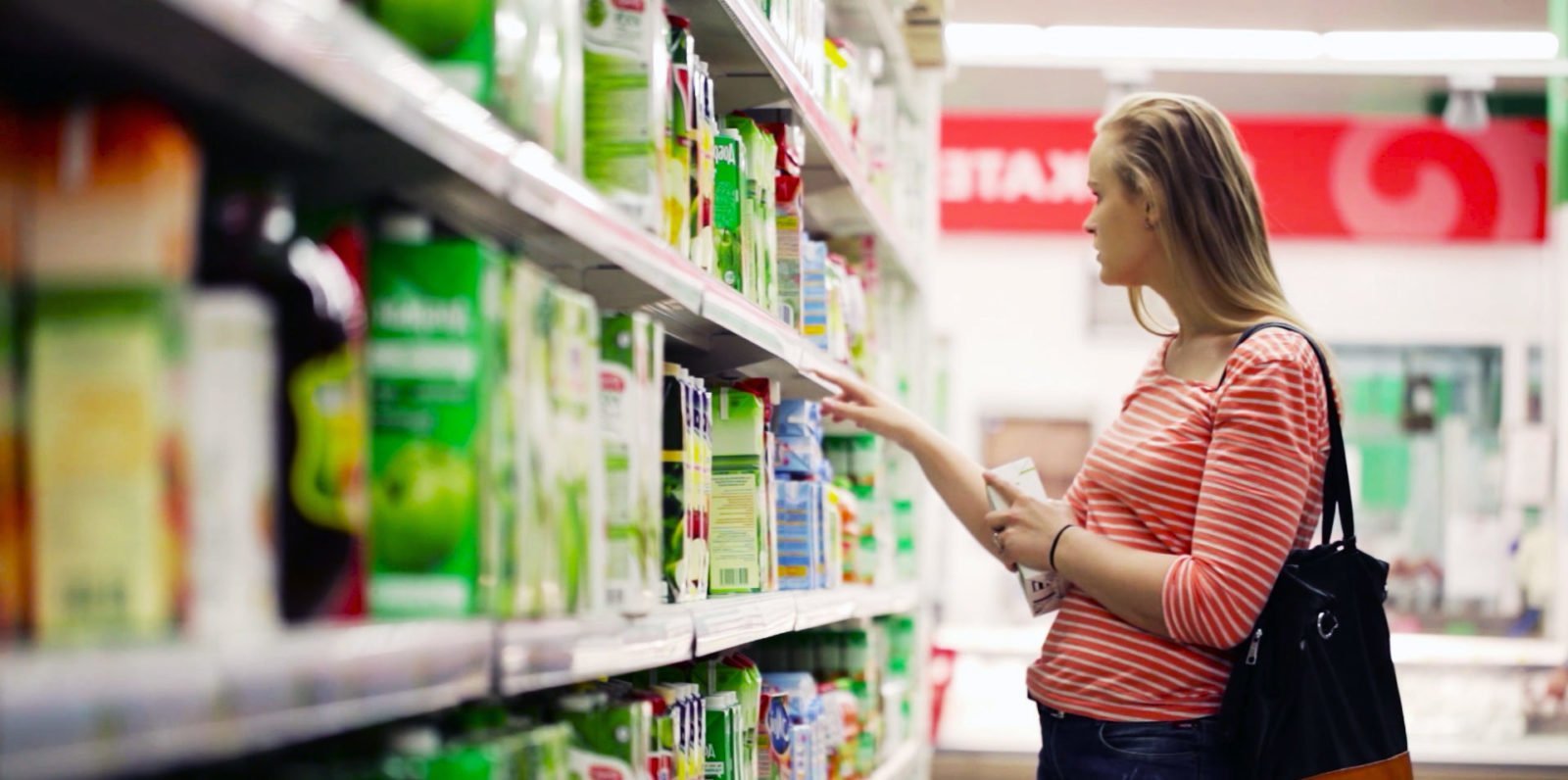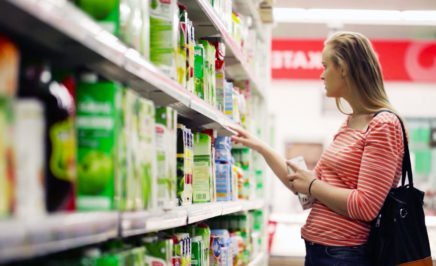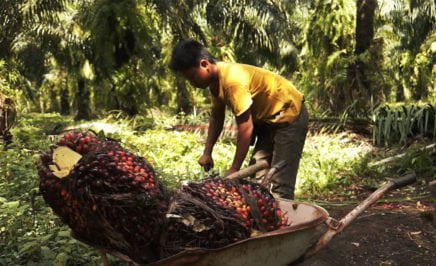By guest blogger Milly Stilinovic
Milly Stilinovic, like the rest of us, goes about her daily routine in ignorance of the human rights violations she is inadvertently contributing to across the span of an average day. Until the penny drops.
It’s 7:45 AM on a Monday. I have managed to oversleep my alarm and have only enough time to shower and dress before embarking on an endless day of engagements. I look at myself in the mirror before pumping a generous wad of Colgate toothpaste onto my toothbrush to begin the ritualistic routine of cleaning my teeth.
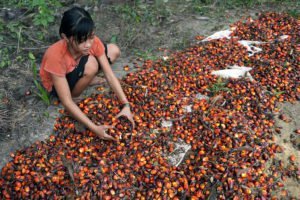
As I’m doing so, a 10 year-old child, known as “C”, is spending the hours he should be in school helping his father carry sacks of loose palm fruit, and pushing wheelbarrows full of heavy bunches of fruit over uneven terrain and narrow bridges. He has to do so, for if his father doesn’t reach his daily target, his already low salary will be penalised , stripping away from their family’s livelihood.
“C” is, according to a recent Amnesty International Report, The Great Palm Oil Scandal, one of the many children subjected to harsh working conditions on Wilmar-owned or subsidised plantations in Indonesia. Wilmar controls over 43 percent of the global palm oil trade, making it the world’s largest processor and merchandiser of palm oil and its derivatives.
Today is going to be one of those days when I wish I hadn’t gotten out of bed at all, because today I will learn that I have inadvertently supported child labour, forced labour, work and human rights abuses.
The statistics
As it stands, the global production of palm oil has doubled over the last decade and, according to Amnesty International, is set to double again by 2020. This statistic is due to the sheer popularity of palm oil and its derivatives which can be found in roughly 50 percent of household products. The reason for this surge is the cheap price of palm oil which makes it one of the world’s most lucrative cash-crops.
This is why, according to Amnesty’s report, palm oil can be found in food products such as packaged bread, breakfast cereals, margarine, chocolate, ice cream, biscuits, and snack food. It is also used in household detergents, shampoos, creams, soap, lipsticks and in biofuels for cars and power plants.
What’s more, Wilmar-supplied palm oil can be found in products from some of Australia’s favourite brands – including Colgate-Palmolive, Nestle and Kellogg’s.
Ignorance is bliss
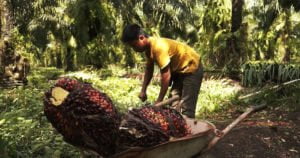
This means that just by waking up and leaving my apartment, several of my actions have contributed towards child and labour abuses – applying a slick of Rexona deodorant, a touch of Vaseline on my lips, the two scoops of Cadbury cocoa I allow myself on the odd occasion.
However, like most, I associate the over-cultivation of palm oil with images of orang-utans wandering the scorched earth with their starving offspring in tow — a result of mass deforestation. It’s a horrific image, but one that doesn’t even scratch the sheer depth of abuse and devastation palm oil cultivation can be credited with.
As my mind is yet to boggle with this realisation, an alarming number of men, women and children throughout plantations in Indonesia and Malaysia are being subjected to back-breaking labour. They’re hidden from the watchful eyes of the Roundtable on Sustainable Palm Oil (RSPO), a non-for-profit who maintain the standard for sustainable palm oil.
“Once people came from the RSPO and they told us to wear our safety gear,” says “F”, who works as a sprayer on a Wilmar plantation.
“When they come, the medical is always kept ready and there is clean water for us to wash and the safety gear is in good condition. The FA [field assistant] told us … that the RSPO people are coming and told us not to tell them anything.”
What can be done?
As I finish my lunch, I’m reading through the Amnesty report on my iPhone. My footprint on child and labour exploitation is starting to set in. My pizza contains a crusty base, tomato paste, mushrooms and cheese — palm oil content unknown.
When I mention this to my lunch date, they reply with the standard response: “It’s in everything. What am I supposed to do!?”
This statement isn’t far from the truth. Food Standards Australia New Zealand (FSANZ), state that current regulations allow for palm oil to be labelled by the generic term ‘vegetable oil’ on ingredient lists. Furthermore, an attempt to correct labeling was rejected on the grounds that the FSANZ concern themselves with regional and domestic food standards, not with the reform of international standards.
However, where my lunch date is incorrect is that there is much that can be done.
Take action
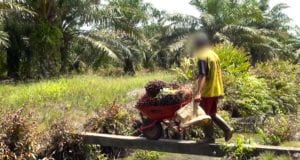
Next comes the realisation that knowledge is power.
“Making informed choices — selecting foods and products that don’t contain palm oil, or choosing to support companies who promise to ethically source sustainable palm oil — reduces the demand but also puts pressure on big brand companies and Wilmar that exploitation of workers’ rights has no place in shopping trolleys in 2017,” says Amnesty International Australia’s Crisis Response Campaign Coordinator, Diana Sayed.
Second, a firm application of pressure on those that knowingly, or unknowingly, engage in labour rights abuses and child labour can potentially secure results.
When the Amnesty International report was released, Nestlé (who were named in the report) issued a statement clarifying the source of the palm oil they use and reiterated their stance on sustainable palm oil.
Lastly, lend your voice to the voiceless. Actively support petitions aimed at reducing child labour and poor working conditions. Spread the word, via your social channels, to inform others of the current state of labour abuse in the palm oil industry.
A new palm-oil free day
That evening, armed with a new dose of knowledge, I set about removing products that I know contain palm oil that isn’t sustainably sourced. I counted 12 in my apartment in total.
Twelve counts of support for those that knowingly aid and abet children to give up any semblance of a childhood. Those that force adults, under grave conditions, to adhere to oppressive work quotas. Those that strip the earth and cause massive devastation to our fragile ecosystem.
